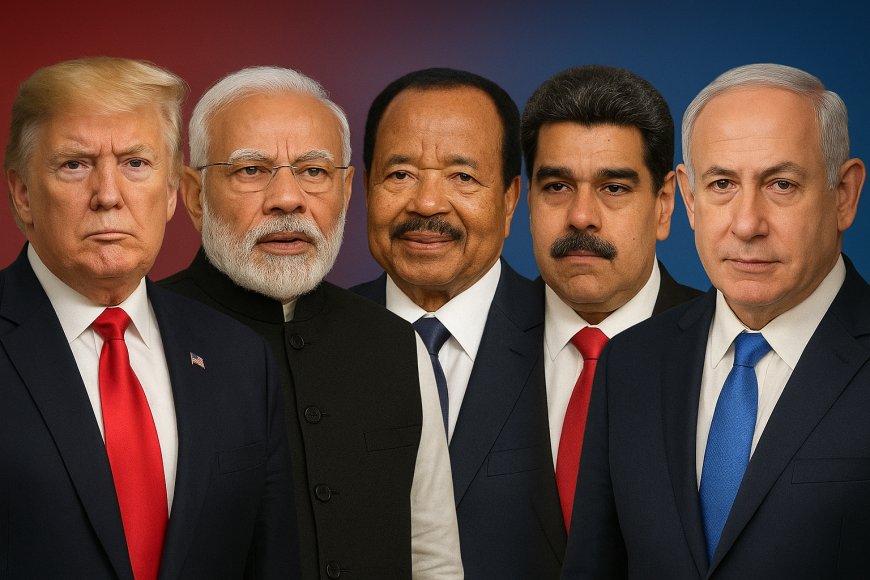Top Global News Stories — Week 42, 2025
This week’s top stories reflect rising political and security tensions across several regions of the world — from Africa and the Middle East to Latin America and South Asia. These developments carry significant implications for governance, diplomacy, and regional stability.

1. Contested Cameroon Presidential Election
Cameroon is facing heightened political uncertainty following its October 12 presidential election. Opposition candidate Issa Tchiroma Bakary has unilaterally declared victory, urging incumbent President Paul Biya to concede.
Biya, who has ruled the country for more than four decades, has not officially responded to the claim. The electoral commission has yet to release full official results, raising fears of a prolonged standoff.
International observers are closely monitoring the situation amid concerns of potential post-election unrest. Several civil society groups have already reported isolated incidents of violence and intimidation in some urban centers. If tensions escalate, this could trigger broader political instability in a country already facing security challenges in its Anglophone regions.
2. Gaza Ceasefire Under Pressure
The fragile ceasefire between Hamas and Israel Defense Forces is hanging by a thread. Just days after a prisoner exchange deal, both sides have accused each other of violating the truce.
The reopening of the Rafah Border Crossing — a key humanitarian gateway — remains stalled, delaying the entry of critical supplies. Aid organizations warn that the humanitarian situation in Gaza Strip is deteriorating rapidly, with shortages of water, food, and medical supplies.
Regional mediators, including United Nations and Egyptian Ministry of Foreign Affairs, are working to stabilize the situation. However, ongoing mutual distrust between the two sides poses a serious risk of renewed escalation.
3. Military Coup in Madagascar
African Union has suspended Madagascar following a sudden military coup that removed President Andry Rajoelina from power. Soldiers took control of key government buildings in the capital, prompting thousands of people to gather and celebrate the takeover.
The military has promised to restore order and form a transitional government, with a new leader expected to be sworn in soon. However, the coup has raised alarm among international partners and human rights organizations, who fear a return to political instability.
Madagascar has experienced several coups and political crises in recent decades. Observers warn that this latest power shift could undermine democratic institutions and derail economic recovery efforts in the country.
4. Growing Instability in Venezuela
Tensions in Venezuela are escalating after reports emerged that the U.S. has authorized covert CIA operations inside the country. President Nicolás Maduro responded by ordering nationwide military exercises and accusing Washington of plotting to overthrow his government.
The U.S. has not publicly confirmed the reports, but the development has already intensified political rhetoric on both sides. Analysts warn that the situation could destabilize the region further, particularly if military mobilizations escalate into confrontation.
This latest flashpoint comes at a time when Venezuela is already grappling with economic hardship, international sanctions, and a long-standing political standoff between the government and opposition forces.
5. India–U.S. Diplomatic Dispute
A diplomatic row has emerged between United States and India after U.S. President Donald Trump claimed that Indian Prime Minister Narendra Modi agreed to stop purchasing Russian oil.
India has categorically denied the claim, stating that no such conversation or agreement took place. New Delhi reaffirmed that its energy policy decisions are based solely on national interest and consumer protection, not external pressure.
The dispute highlights ongoing tensions over India’s neutral stance on global conflicts involving Russia. It also underscores the delicate balance in India–U.S. relations, especially in the lead-up to several key international summits.
Also Trending: University Strike in Nigeria
In Nigeria, the Academic Staff Union of Universities (ASUU) has launched a two-week warning strike, disrupting academic activities nationwide. The union is demanding improved funding, better working conditions, and the fulfillment of previous agreements with the government.
The National Assembly of Nigeria has stepped in to mediate talks aimed at preventing a prolonged shutdown of the university system. The strike has raised concerns among students and parents, who fear extended disruptions similar to previous industrial actions.
Conclusion
This week’s headlines capture a moment of global volatility — with political disputes, security challenges, and diplomatic tensions unfolding across multiple continents. From contested elections and fragile ceasefires to energy diplomacy and domestic unrest, these stories will likely shape international relations and policy discussions in the weeks to come.
